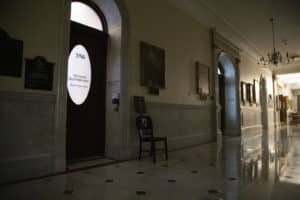
The darkened hallway outside House Speaker Ron Mariano's third-floor State House office around 11 p.m. on July 31, 2024. Photo by Chris Lisinski | State House News Service
There’s got to be a better way than this.
Once again, it was a mad dash to the finish line on Beacon Hill as the two-year legislative session came to a frantic close last Thursday.
Winter turned to spring and then to summer, but the Legislature failed to pass any of the major bills it has been weighing, from housing and economic development to proposal to rein in for-profit hospital operators in wake of the Steward Health Care System disaster.
As if jolted awake from their slumber by the urgent warnings of a cockpit collision system, House and Senate leaders and their lieutenants pulled back hard on the controls and kicked back-room negotiations into high gear in the last week or two of July.
Key Bills Seemingly Dead
First off, the Legislature finally passed a $58 billion-plus budget on July 19 – nearly three weeks after the start of the fiscal year
It was the 14th year in a row that state lawmakers missed the July 1 deadline for passing a new budget to go with the new fiscal year.
In fact, Massachusetts was the last state in the nation to pass an annual budget this year, Axios reports.
Yet as state lawmakers began the last day of the legislative session on July 31, several major bills remained to be hammered out.
A $5.4 billion to $6.5 billion housing bond bill and a $2 billion to $3 billion economic development bill made up some of the biggest-ticket items still outstanding as the clock ticked on the final hours of the session.
With home prices and rents setting new records each month, the Healey administration’s housing bill was arguably the most important piece of business after the budget.
What’s in the Affordable Homes Act? Here’s our breakdown.
By Thursday morning, as the session was extended into extra innings for a few hours, it became clear that while the housing bill passed, most of the other major legislative proposals had expired on the operating table.
Among the casualties was an economic development bill that would have given a boost in the hundreds of millions of dollars to the life sciences industry – arguably now the state’s leading growth engine. It now appears that this may be taken up by a special session of the Legislature at a yet-to-be-announced time later this year, but should it have ever come to this in the first place?
Also failing to cross the finish line was a climate bill that would have streamlined the approval process for new grid infrastructure.
Given the years-long slog now required to move new transmission lines through the permitting process – and NIMBY opposition – it is considered a crucial piece of decarbonizing the state’s energy sector.
A bill that would have given Boston more than 200 new liquor licenses – and helped spur restaurant openings and economic growth – also expired although, per State House News Service, House Speaker Ron Mariano claims it and a select few other measures like an Everett soccer stadium deal may still have a path forward during so-called “informal sessions” this fall.

House Speaker Ron Mariano (second from left) and his top deputies address reporters in a State House hallway as the legislative session extended into extra innings in the early morning of Aug. 1, 2024. Photo by Chris Lisinski | State House News Service
Silver Lining: No Boston Tax Hike?
Still, a silver lining of sorts emerged out of all the legislative, race-to-finish chaos on Beacon Hill.
Boston Mayor Michelle Wu’s toxic tax plan to boost rates on already reeling office and commercial buildings failed to make the cut as well.
Boston faces a large and looming revenue hit from plunging office building values amid the post-pandemic shift to remote work.
Without any intervention by City Hall, Boston homeowners would likely have to pick up the slack, leading to a double-digit increase in residential tax rates.
Wu’s proposal? Shift even more of the city’s overall tax burden – even beyond what the state allows, hence the need for legislative approval – onto office and commercial properties.
However, the mayor’s attempt to squeeze as many dollars as possible out of the ailing office building sector with higher tax rates has sparked strong opposition from city business and real estate leaders, which contend it would make a bad situation even worse.

Scott Van Voorhis
Wu’s proposal made it out of the House but ultimately stalled out in the Senate.
While Wu agreed to somewhat reduce the scope and term of the proposal in a last-minute deal with top Mariano lieutenant Rep. Aaron Michelwitz, knocking it down from five years to three, it was not enough to overcome a more skeptical Senate.
Each of the proposals mentioned above deserved months of public scrutiny and debate, including votes at normal times open for all the public to see.
Instead, as has been the case since time immemorial, most of the debating and negotiating happened behind closed doors, with countless major decisions made in the final, late-night and early morning hours of a two-year legislative session.
Scott Van Voorhis is Banker & Tradesman’s columnist and publisher of the Contrarian Boston newsletter; opinions expressed are his own. He may be reached at sbvanvoorhis@hotmail.com.
Editor’s Note Aug. 5, 2024: This column has been updated to reflect statements from Gov. Maura Healey, House Speaker Ron Mariano and Senate President Karen Spilka that a special session will be called later this year to pass the unfinished economic development bill.




